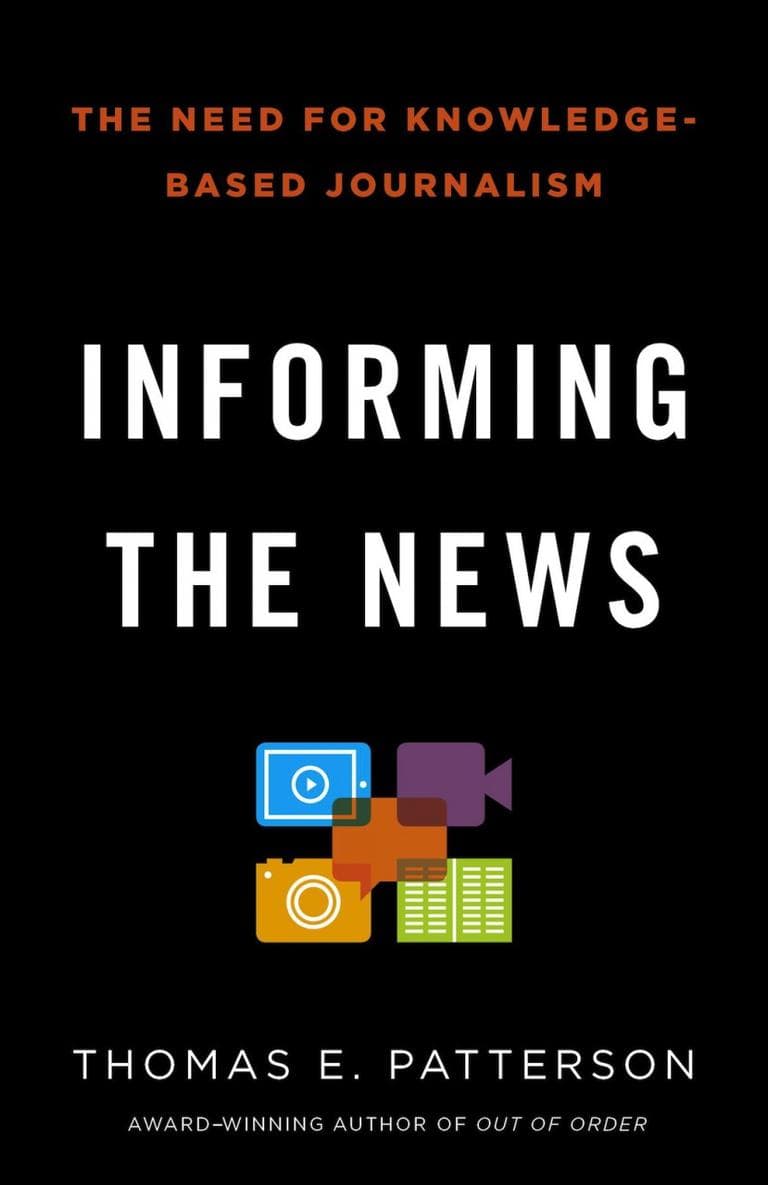Advertisement
Harvard's Thomas Patterson Takes The Media To Task
I read Thomas E. Patterson’s superb “Informing the News: The Need for Knowledge-Based Journalism” during the recent government shutdown. It’s hard to think of another new nonfiction book that could have been more mesmerizing.
Depending on the TV newscast or radio program I turned on, or the newspaper or magazine for an article, I might have believed there were two completely different events occurring that just happened to share the same title, instead of one news event with many facets to it. In fact, news coverage about the government shutdown could have been a case study in “Informing the News,” whose chapters have titles like “The Source Problem,” “The Knowledge Problem,” and “The Audience Problem.”
It’s no accident that “Informing the News” is framed around a set of problems; it sets forth a convincing case that Americans are currently “ill-served by the intermediaries — the journalists, …talk show hosts, pundits, and bloggers — that claim to be their trusted guides.”
In short, “Information corruption is deeply rooted in contemporary America.”
Patterson — Bradlee Professor of Government and the Press at Harvard’s John F. Kennedy School of Government,and the author of previous groundbreaking books like “The Vanishing Voter” (on electoral participation) and “Out of Order” (on the media’s role in politics) — recognizes that this is hardly the first time Americans have received their news from less than reliable outlets. Perhaps the most infamous example is the early 20th century period of “yellow journalism,” with its made-to-shock headlines and sensationalized stories. That era begat “objective journalism,” which “sought to strip the news of unfounded opinion,” and was the dominant reporting style for print and broadcast news for much of the remaining 20th century.

But today, trying to maintain objective reporting standards is a thin defense against the current multi-media onslaught: always-on cable news stations with boundaries blurred between news, entertainment and propaganda; deeply partisan radio talk shows; “news” websites that wholly blend together news events and political views. Add to this, impossibly shrinking deadlines, and you get news coverage that is shallow and repetitive rather than substantive and truly informative. As the late Jack Germond noted, “Ninety percent of the coverage is derivative of what ten percent produce.”
Patterson makes the point that the obsession with objective reporting by some news organizations, like CNN, create on-air discussions that can present false equivalencies. For example, if there is one guest speaking about the dangers of global warming, there is automatically a second guest speaking against global warming, even if the scientific evidence doesn’t warrant equal arguments on both sides of an issue.
As Patterson repeatedly underscores in “Informing the News,” journalists are crucial to a democracy. It is the journalists who “help us understand the world of public affairs beyond our direct experience.” Faulty or purposely skewed news outlets degrade news presentations into mere echo chambers that don’t inform, but simply reinforce, entrenched beliefs. Over-reliance on sound-bites relegates news stories to shrill he-said/she-said debates, reducing reporters from discerning writers to “stenographers.”
How can there be rational public debate about any issue of local or national importance when “large numbers of people are out of touch with reality.” To cite just two examples from the past decade, the significant number of people convinced that Iraq was involved in the 9/11 attacks, or that the Affordable Care Act would enact government “death panels” to prematurely end the lives of senior citizens.
As Patterson cautions, “It is a short step from misinformation to mischief.” To help address this, he proposes a new form of journalism: “knowledge-based journalism,” which goes beyond the traditional emphasis on reporting, interviewing and writing.
“Informing the News” grew out of Patterson’s participation in the Carnegie-Knight Initiative on the Future of Journalism. From 2005 to 2011, the initiative, comprising 11 journalism schools nationwide and Harvard’s Shorenstein Center on the Press, Politics and Public Policy, sought to transform journalism to meet the needs of a complex digital age.
Although most of today’s journalists hold degrees in the subjects they’re writing about, many inevitably know less about a topic than the person they’re interviewing or reporting about.
It is a short step from misinformation to mischief.
Thomas Patterson
Patterson augments the narratives and research findings with quotes from many journalism heavy-hitters such as Bill Kovach, Walter Pincus, Linda Greenhouse, and especially Walter Lippmann. Despite these sources, however, Patterson’s voice comes through, clear and rational.
“Informing the News” is a bracing read. Although there is more information available to us now than at any other time in history, “never before have we had a greater need for information grounded in facts rather than spin and speculation.”
Read an excerpt from "Informing the News" here.
Carol Iaciofano’s book reviews and op-ed columns have appeared in publications including The Boston Globe, The Boston Herald, and The Hartford Courant. She is also a co-author of the pop culture computer anthology, “Digital Deli.”
This program aired on October 29, 2013. The audio for this program is not available.